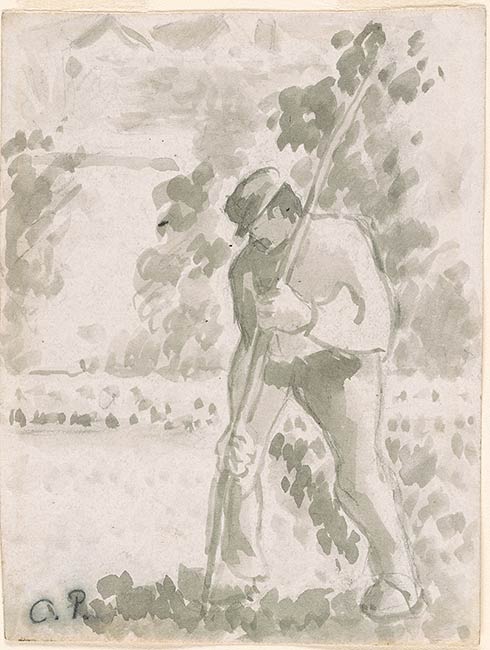
This drawing featuring a laborer with a bean pole is possibly related to a collaborative project undertaken during the final decades of Pissarro's life with his son Lucien. The series "Travaux des champs" (Fieldwork) was initially conceived as a published portfolio, of which only twenty-five copies were issued. After his father's death, Lucien Pissarro published many of the drawings in Emile Moselly's "La Charrue d'érable" (The Maple Cart; Paris, 1912). The artists intended to illustrate peasant activities in the country and images of seasonal change.
The Morgan sheet is stylistically and thematically related to two drawings in the Ashmolean Museum, Oxford, also in gray wash with black chalk, of a male peasant placing a bean pole in the ground (Brettell and Lloyd 1980, nos. 350, 351). The composition of the Morgan and Ashmolean drawings is derived from two paintings made ca. 1892 (Pissarro and Venturi 1939, nos. 1269, 1270). The large-scale figure and the solemn labor evoke comparison to the monumental solitary laborers of Pissarro's predecessor, Jean-François Millet (1814-1875).
Unlike the Ashmolean studies, however, the Morgan sheet lacks a legible setting, and the figure lacks convincing anatomy.
Inscribed at lower left in pen and black ink, "C.P.".
McCrindle, Joseph F., former owner.
Richard R. Brettell and Christopher Lloyd, “A catalogue of the drawings by Camille Pissarro in the Ashmolean Museum, Oxford.” Oxford: 1980.
L.-R. Pissarro and L. Venturi, “Camille Pissarro: Son art et son oeuvre.” 2 vols. Paris: 1939.
